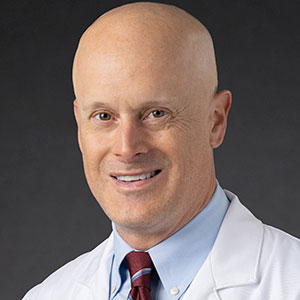New statistics from the American Cancer Society’s (ACS) 2024 report show that lung cancer rates in Georgia are significantly higher than the national average. An estimated 7,350 Georgians will be diagnosed with lung cancer this year. Only six other states will have more new cases.
For Jason Budde, thoracic surgeon at City of Hope® Cancer Center Atlanta, the main reasons for Georgia’s elevated lung cancer cases are clear: smoking and, to a lesser extent, radon.
“Since there’s not really a big familial component like with breast cancer or certain types of colon cancer, it all hinges on smoking,” Dr. Budde, says. “Also, radon content in the South tends to be higher, and that’s contributory to lung cancer.”
Smoking is the leading cause of lung cancer, which is currently deadliest and third-most common cancer diagnosed in the United States. Radon exposure is the biggest risk factor for non-smokers, according to the U.S. Environmental Protection Agency. Radon is a colorless, odorless radioactive gas that forms when metals in rocks and soil break down. People are exposed to radon when the gas seeps through cracks and gaps in building foundations, basements and subfloors.
Smoking cessation and radon monitoring may help Georgians reduce their risk of lung cancer. And innovative lung cancer screening options, combined with careful monitoring for at-risk patients, may be a successful combination for catching the disease early, when more treatment options are available. This article covers topics including:
- Why lung cancer rates may be higher in Georgia
- Lung cancer screening is key
- Diagnosing lung cancer in Georgia
- Georgia lung cancer treatment
If you or a loved one has recently been diagnosed with lung cancer and are looking for a second opinion, call us 24/7 at (877) 524-4673.
Why Lung Cancer Rates May Be Higher in Georgia

Georgia already has higher-than-average smoking rates, at 16%. Add the fact that 22% of lung cancer patients in Georgia do not receive any treatment for the condition, and the ACS’s cancer statistics start to make sense.
“The majority of patients are found at an advanced stage,” Dr. Budde explains. Therefore, catching lung cancer early is among the most effective ways to prevent the disease from developing further.
“There are very good data that show that early detection leads to more curative procedures and survival benefits,” Dr. Budde says. “We save lives by screening people, so screening early is the key.”
Only six other states will have more new cases – though the ACS report notes that this year’s rate is slightly down from last year.
Lung Cancer Screening Is Key
Cigarette smoking still accounts for 30% of all cancer deaths across the United States, and as much as 40% in the South. The good news is that, with early screening, lung cancer survival rates increase by 30 to 50%, according to data from the U.S. Preventive Task Force.
The guidelines recommend screening for people who fit these two criteria:
- Aged between 50 and 80
- Have or had a 20 pack-year smoking habit
Twenty pack-years means that you either smoked one pack of cigarettes a day for 20 years, or a half pack a day for 40 years, and so on.
Screening usually involves a computed tomography (CT) scan. At-risk patients are urged to get screened once a year, and almost all insurance plans and Medicare cover the procedure.
“At City of Hope’s Atlanta Lung Cancer Center, we have a screening program, as lots of places do. That means you become part of our database, and we keep tabs on you,” Dr. Budde says. “Then, when you’re ready for your next scan, we call you.”
Diagnosing Lung Cancer in Georgia
Diagnosing lung cancer does not typically require invasive procedures. If a CT scan reveals a lung nodule, then a team of specialists reviews the scans to determine the next steps. The City of Hope Atlanta Rapid Lung Nodule Diagnosis Program can provide results within days rather than weeks, allowing treatment to begin faster.
Dr. Budde’s team also uses another innovative tool: artificial intelligence (AI).
“Although thousands of scans are being done and each is individually read and interpreted, AI helps us collect them all and use the best medical evidence to decide what’s next,” he says.
Several new screening options are in development, too, including blood tests that look for tumor DNA for lung cancer and other conditions. While these are not yet approved for routine use, Dr. Budde says they are available commercially and show a great deal of promise.
Georgia Lung Cancer Treatment
Approaches to treating lung cancer have also evolved. Many patients now undergo chemotherapy, immunotherapy or targeted therapy before surgery, with the goal of shrinking tumors, and, “in most cases, patients may then undergo a minimally invasive procedure with a short hospital stay and preemptive pain control,” says Dr. Budde.
The team also puts a strong focus on lung-sparing surgery, which aims to leave as much lung tissue as possible.
Studies have shown that a smaller resection of lung tissue, known as a segmentectomy, is as effective as the standard resection, or lobectomy, at removing the cancer and preventing recurrence, Dr. Budde explains. In those cases, patients may then keep more breathing capacity as they heal up, fight their cancer, and live their lives.
Bringing these cutting-edge techniques to patients at City of Hope Atlanta is one way Dr. Budde hopes to boost long-term survival rates and quality of life.
“This way, patients have the best chance of cure, the least chance of recurrence,” he says, “and in their recovery phase, they’re the best they can be.”
If you or a loved one has recently been diagnosed with lung cancer and are looking for a second opinion, call us 24/7 at (877) 524-4673.
